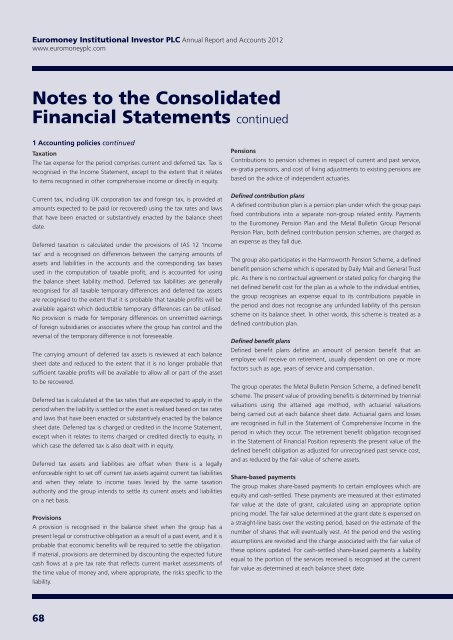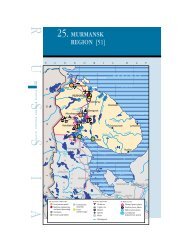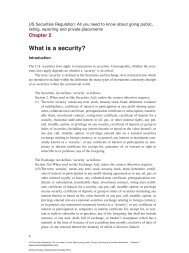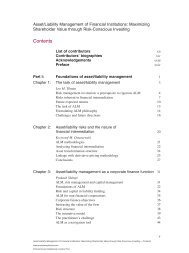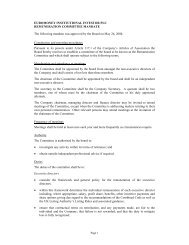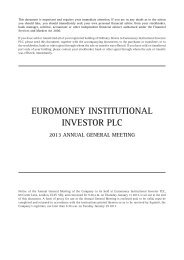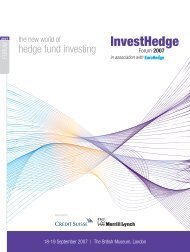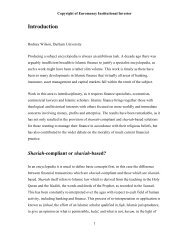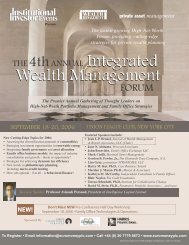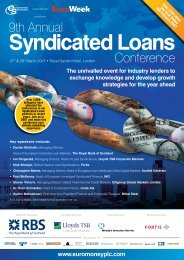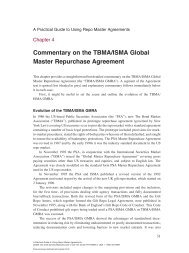Annual Report & Accounts 2012 - Euromoney Institutional Investor ...
Annual Report & Accounts 2012 - Euromoney Institutional Investor ...
Annual Report & Accounts 2012 - Euromoney Institutional Investor ...
You also want an ePaper? Increase the reach of your titles
YUMPU automatically turns print PDFs into web optimized ePapers that Google loves.
<strong>Euromoney</strong> <strong>Institutional</strong> <strong>Investor</strong> PLC <strong>Annual</strong> <strong>Report</strong> and <strong>Accounts</strong> <strong>2012</strong><br />
www.euromoneyplc.com<br />
Notes to the Consolidated<br />
Financial Statements continued<br />
1 Accounting policies continued<br />
Taxation<br />
The tax expense for the period comprises current and deferred tax. Tax is<br />
recognised in the Income Statement, except to the extent that it relates<br />
to items recognised in other comprehensive income or directly in equity.<br />
Current tax, including UK corporation tax and foreign tax, is provided at<br />
amounts expected to be paid (or recovered) using the tax rates and laws<br />
that have been enacted or substantively enacted by the balance sheet<br />
date.<br />
Deferred taxation is calculated under the provisions of IAS 12 ‘Income<br />
tax’ and is recognised on differences between the carrying amounts of<br />
assets and liabilities in the accounts and the corresponding tax bases<br />
used in the computation of taxable profit, and is accounted for using<br />
the balance sheet liability method. Deferred tax liabilities are generally<br />
recognised for all taxable temporary differences and deferred tax assets<br />
are recognised to the extent that it is probable that taxable profits will be<br />
available against which deductible temporary differences can be utilised.<br />
No provision is made for temporary differences on unremitted earnings<br />
of foreign subsidiaries or associates where the group has control and the<br />
reversal of the temporary difference is not foreseeable.<br />
The carrying amount of deferred tax assets is reviewed at each balance<br />
sheet date and reduced to the extent that it is no longer probable that<br />
sufficient taxable profits will be available to allow all or part of the asset<br />
to be recovered.<br />
Deferred tax is calculated at the tax rates that are expected to apply in the<br />
period when the liability is settled or the asset is realised based on tax rates<br />
and laws that have been enacted or substantively enacted by the balance<br />
sheet date. Deferred tax is charged or credited in the Income Statement,<br />
except when it relates to items charged or credited directly to equity, in<br />
which case the deferred tax is also dealt with in equity.<br />
Deferred tax assets and liabilities are offset when there is a legally<br />
enforceable right to set off current tax assets against current tax liabilities<br />
and when they relate to income taxes levied by the same taxation<br />
authority and the group intends to settle its current assets and liabilities<br />
on a net basis.<br />
Provisions<br />
A provision is recognised in the balance sheet when the group has a<br />
present legal or constructive obligation as a result of a past event, and it is<br />
probable that economic benefits will be required to settle the obligation.<br />
If material, provisions are determined by discounting the expected future<br />
cash flows at a pre tax rate that reflects current market assessments of<br />
the time value of money and, where appropriate, the risks specific to the<br />
liability.<br />
Pensions<br />
Contributions to pension schemes in respect of current and past service,<br />
ex-gratia pensions, and cost of living adjustments to existing pensions are<br />
based on the advice of independent actuaries.<br />
Defined contribution plans<br />
A defined contribution plan is a pension plan under which the group pays<br />
fixed contributions into a separate non-group related entity. Payments<br />
to the <strong>Euromoney</strong> Pension Plan and the Metal Bulletin Group Personal<br />
Pension Plan, both defined contribution pension schemes, are charged as<br />
an expense as they fall due.<br />
The group also participates in the Harmsworth Pension Scheme, a defined<br />
benefit pension scheme which is operated by Daily Mail and General Trust<br />
plc. As there is no contractual agreement or stated policy for charging the<br />
net defined benefit cost for the plan as a whole to the individual entities,<br />
the group recognises an expense equal to its contributions payable in<br />
the period and does not recognise any unfunded liability of this pension<br />
scheme on its balance sheet. In other words, this scheme is treated as a<br />
defined contribution plan.<br />
Defined benefit plans<br />
Defined benefit plans define an amount of pension benefit that an<br />
employee will receive on retirement, usually dependent on one or more<br />
factors such as age, years of service and compensation.<br />
The group operates the Metal Bulletin Pension Scheme, a defined benefit<br />
scheme. The present value of providing benefits is determined by triennial<br />
valuations using the attained age method, with actuarial valuations<br />
being carried out at each balance sheet date. Actuarial gains and losses<br />
are recognised in full in the Statement of Comprehensive Income in the<br />
period in which they occur. The retirement benefit obligation recognised<br />
in the Statement of Financial Position represents the present value of the<br />
defined benefit obligation as adjusted for unrecognised past service cost,<br />
and as reduced by the fair value of scheme assets.<br />
Share-based payments<br />
The group makes share-based payments to certain employees which are<br />
equity and cash-settled. These payments are measured at their estimated<br />
fair value at the date of grant, calculated using an appropriate option<br />
pricing model. The fair value determined at the grant date is expensed on<br />
a straight-line basis over the vesting period, based on the estimate of the<br />
number of shares that will eventually vest. At the period end the vesting<br />
assumptions are revisited and the charge associated with the fair value of<br />
these options updated. For cash-settled share-based payments a liability<br />
equal to the portion of the services received is recognised at the current<br />
fair value as determined at each balance sheet date.<br />
68


